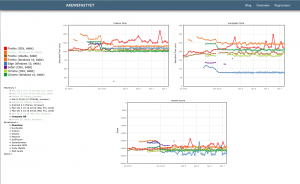In the dawn of arewefastyet only 2 machines were running and only three benchmarks were important. At that time it was quite easy to just iterate the different benchmarks once in a while and spot the regressions. Things have come a long way since. Due to the enormous increase in number of benchmarks and machines I created a regression detector, which wasn’t as easy as it sounds. False positives and false negative are the enemy of such a system. Bimodal benchmarks, noise, compiler perturbations, the amount of datapoints … all didn’t help. Also this had low priority, given I’m supposed to work on improving JIT performance and not recording JIT performance.
Perfherder came along, which aims to collect any performance data in a central place and to act on that information. Which has some dedicated people working on it. Since the beginning of 2016 AWFY has started to use that system more and more. We have been sending the performance data to Perfherder for a few months now and Perfherder has been improving to allow more and more functionality AWFY needs. Switching the regression detection from AWFY to Perfherder is coming closer, which will remove my largest time drain and allow me to focus even more on the JIT compiler!
The alerts perfherder creates are visible at:
https://treeherder.allizom.org/perf.html#/alerts?status=0&framework=5
Since last week we now can request alerts on the subscores of benchmark, which is quite important for JS benchmarks. Octane has a variance of about 2% and a subscore of the benchmark that regresses with 10% will only decrease the full benchmark score with 1%. As a result this is within the noise levels and won’t get detected. This week this feature was enabled on AWFY, which will increase the correctness and completeness of the alerts Perfherder creates.
I want to thank Joel Maher and William Lachance with the help of this.
